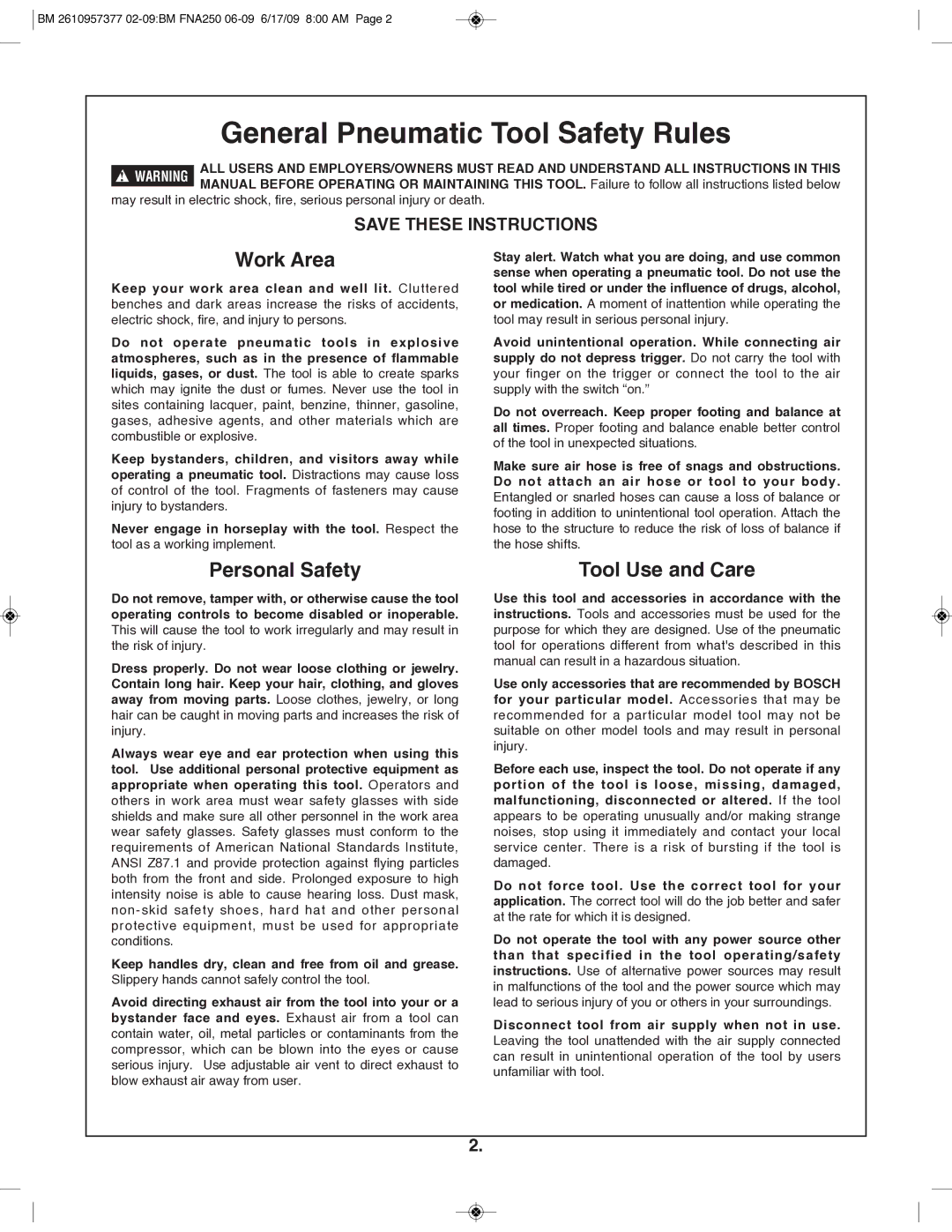
BM 2610957377
General Pneumatic Tool Safety Rules
ALL USERS AND EMPLOYERS/OWNERS MUST READ AND UNDERSTAND ALL INSTRUCTIONS IN THIS MANUAL BEFORE OPERATING OR MAINTAINING THIS TOOL. Failure to follow all instructions listed below
may result in electric shock, fire, serious personal injury or death.
SAVE THESE INSTRUCTIONS
Work Area
Keep your work area clean and well lit. Cluttered benches and dark areas increase the risks of accidents, electric shock, fire, and injury to persons.
Do not operate pneumatic tools in explosive atmospheres, such as in the presence of flammable liquids, gases, or dust. The tool is able to create sparks which may ignite the dust or fumes. Never use the tool in sites containing lacquer, paint, benzine, thinner, gasoline, gases, adhesive agents, and other materials which are combustible or explosive.
Keep bystanders, children, and visitors away while operating a pneumatic tool. Distractions may cause loss of control of the tool. Fragments of fasteners may cause injury to bystanders.
Never engage in horseplay with the tool. Respect the tool as a working implement.
Stay alert. Watch what you are doing, and use common sense when operating a pneumatic tool. Do not use the tool while tired or under the influence of drugs, alcohol, or medication. A moment of inattention while operating the tool may result in serious personal injury.
Avoid unintentional operation. While connecting air supply do not depress trigger. Do not carry the tool with your finger on the trigger or connect the tool to the air supply with the switch “on.”
Do not overreach. Keep proper footing and balance at all times. Proper footing and balance enable better control of the tool in unexpected situations.
Make sure air hose is free of snags and obstructions. Do not attach an air hose or tool to your body. Entangled or snarled hoses can cause a loss of balance or footing in addition to unintentional tool operation. Attach the hose to the structure to reduce the risk of loss of balance if the hose shifts.
Personal Safety | Tool Use and Care |
Do not remove, tamper with, or otherwise cause the tool operating controls to become disabled or inoperable. This will cause the tool to work irregularly and may result in the risk of injury.
Dress properly. Do not wear loose clothing or jewelry. Contain long hair. Keep your hair, clothing, and gloves away from moving parts. Loose clothes, jewelry, or long hair can be caught in moving parts and increases the risk of injury.
Always wear eye and ear protection when using this tool. Use additional personal protective equipment as appropriate when operating this tool. Operators and others in work area must wear safety glasses with side shields and make sure all other personnel in the work area wear safety glasses. Safety glasses must conform to the requirements of American National Standards Institute, ANSI Z87.1 and provide protection against flying particles both from the front and side. Prolonged exposure to high intensity noise is able to cause hearing loss. Dust mask,
Keep handles dry, clean and free from oil and grease. Slippery hands cannot safely control the tool.
Avoid directing exhaust air from the tool into your or a bystander face and eyes. Exhaust air from a tool can contain water, oil, metal particles or contaminants from the compressor, which can be blown into the eyes or cause serious injury. Use adjustable air vent to direct exhaust to blow exhaust air away from user.
Use this tool and accessories in accordance with the instructions. Tools and accessories must be used for the purpose for which they are designed. Use of the pneumatic tool for operations different from what's described in this manual can result in a hazardous situation.
Use only accessories that are recommended by BOSCH for your particular model. Accessories that may be recommended for a particular model tool may not be suitable on other model tools and may result in personal injury.
Before each use, inspect the tool. Do not operate if any portion of the tool is loose, missing, damaged, malfunctioning, disconnected or altered. If the tool appears to be operating unusually and/or making strange noises, stop using it immediately and contact your local service center. There is a risk of bursting if the tool is damaged.
Do not force tool. Use the correct tool for your application. The correct tool will do the job better and safer at the rate for which it is designed.
Do not operate the tool with any power source other than that specified in the tool operating/safety instructions. Use of alternative power sources may result in malfunctions of the tool and the power source which may lead to serious injury of you or others in your surroundings.
Disconnect tool from air supply when not in use. Leaving the tool unattended with the air supply connected can result in unintentional operation of the tool by users unfamiliar with tool.
2.
